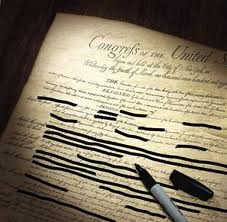
A Truly Ugly Precedent
It has long, however, been my opinion, and I have never shrunk from its expression…that the germ of dissolution of our federal government is in the constitution of the federal Judiciary;…working like gravity by night and by day, gaining a little today and a little tomorrow, and advancing its noiseless step like a thief, over the field of jurisdiction, until all shall be usurped. Â Thomas Jefferson
In The Dirty Dozen, Robert Levy and William Mellor point out that it’s actually very seldom that a Constitutional issue is pure black and white. Home Building & Loan Association v. Blaisdell (1934), was one of those rare cases. In an attempt to stem home and farm foreclosures, Minnesota passed a law which allowed a mortgagor to temporarily pay court determined rent that was set well below the contractual mortgage amount. The mortgage holder could take no foreclosure action while the rent was being paid.
The Constitution reads, “No state shall pass any law impairing the obligation of contracts.â€Â During the Constitutional Convention in 1787, foreclosures were rampant, and several states had passed laws that impaired contracts by forcing debtors to accept purposely inflated state-generated paper money as legal tender. The result of these laws put a stranglehold on credit markets, deepening difficult economic times. The Framers didn’t want this to happen again. Their intent—and the wording could not be clearer—was to preclude the exact type of action that was taken by Minnesota.
Minnesota’s violation of the Contracts Clause could not be more blatant, yet the Supreme Court arbitrarily overrode the Constitution and gave the states permission to violate private contracts. Because the decision had national implications, the result of this sanctioned contract interference chilled the nation’s credit markets. Lenders could no longer rely on recovering the collateral that backed a loan. The Supreme Court’s action was heartless because its sympathetic treatment of a few borrowers helped to deepen and elongate the Great Depression, which caused enormous suffering for a great swath of the population.
 There is another aspect of Blaisdell which makes it a monumental decision: it started the modern trend of looking at the Constitution as a living force that could be molded to meet popular passions. The Constitution had certainly been violated in the past, but the basic meaning had not been irrevocably altered. Once the floodgates had been pried open, the judiciary progressively stretched their political powers. The Supreme Court discovered that when they single-handedly overruled Constitutional clauses, they suffered only a few complaints, while on the other side, so many cheered that the courts began to feel comfortable in the role of Supreme Law of the Land. The FDR courts and those that followed now had license to ignore the wording and intent of the Constitution. From that point forward, what the courts said was law.
There is another aspect of Blaisdell which makes it a monumental decision: it started the modern trend of looking at the Constitution as a living force that could be molded to meet popular passions. The Constitution had certainly been violated in the past, but the basic meaning had not been irrevocably altered. Once the floodgates had been pried open, the judiciary progressively stretched their political powers. The Supreme Court discovered that when they single-handedly overruled Constitutional clauses, they suffered only a few complaints, while on the other side, so many cheered that the courts began to feel comfortable in the role of Supreme Law of the Land. The FDR courts and those that followed now had license to ignore the wording and intent of the Constitution. From that point forward, what the courts said was law.
Getting Back to Basics
Restoring the Constitution to substantiality won’t be easy … or quick. For one thing, the selection of a Supreme Court Justice has become a highly charged emotional event. It’s instructive that political movements spend an inordinate amount of resources influencing Supreme Court nominations, and hyperventilate when fighting a nomination they’re don’t like. Everyone knows that these are enormously powerful people—with life tenure. Everyone also pretends their candidates are impassive judges that measure every decision by the law, but if that were so, no one who care so much about who sat on the bench.
The only way to repair our Constitution is with justices that have a deep-seated loyalty to the founding principles. Since presidents typically appoint based on political leanings, it will be up to the Senate to advise the president on acceptable candidates, and then consent only to candidates that can show a life’s work of being faithful to the Constitution. If Constitutional integrity is going to be restored, the weight of the task will be on the Senate.
James D. Best is the author of Tempest at Dawn, a novel about the 1787 Constitutional Convention.
 The posts are coming!
The posts are coming!


1 comment
Thanks for a great review. Hadley Arkes also discusses this case in “Constitutional Illusions.” He writes, “For built into every contract now was the possibility that the obligation of the contract could be suspended or dissolved at any moment by the intervention of the legislature..Whatever an agreement may be called under these new terms, it would certainly not contain the ingredients that defined a ‘contract.'”
[Reply]
Leave a Comment